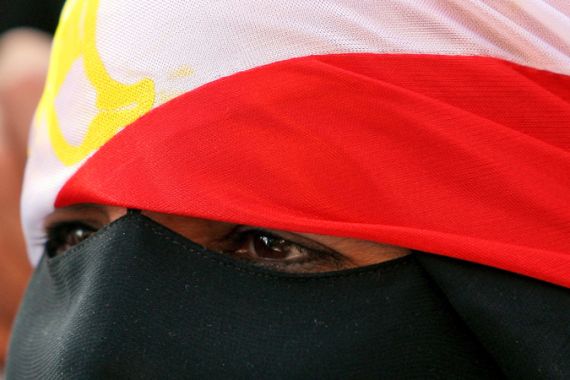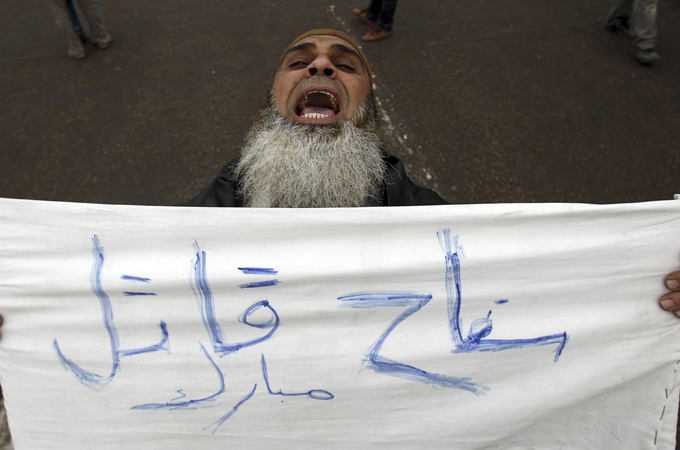Egypt: Revolution or bust
The international community has been energised by recent events, but where was it through the decades of oppression?

 |
| When a regime becomes especially venal, the human spirit occasionally bursts forth through the actions of large numbers of people in unison [Reuters] |
I have spent the last week, like millions of other people, completely immersed in supporting the brave Egyptian citizens of Tahrir Square. I have spread every piece of truth about them that I could get my hands on to my social network. Indeed their revolution is perhaps the first that was self-consciously created by a young internet force that actively pleaded for the rest of us to Twitter and blog and Facebook. It has been heartbreaking and glorious, even for those of us who only participated with our fingertips.
What concerns me coming out of the experience is a gnawing question for us bystanders: Where have we been for all these decades of oppression? And why and how were we suddenly energised by demonstrations in Tahrir Square, but failed to be mobilised all those previous decades when people such as these Egyptian citizens needed us? I am old enough to remember, with some sadness, the way in which we all woke up for Tiananmen Square, emboldened, marching on the streets of the US, only to be lulled back to a studied passivity by the resolute brutality of the Chinese regime.
I have been working for 27 years not for revolution in the Middle East, but evolution. I have worked in Palestine, Israel and Syria, and to some extent Jordan. I have worked with amazing people from every one of these countries and more. Revolutions do not come from the dust; they come from a glacial pace of education and solidarity in building shared values of human rights, civil society, a culture of debate, economic rights and people-centred development. Then, one day, when a regime becomes especially venal and stupid, with bread prices rising to absurd levels, the human spirit occasionally bursts forth through the actions of large numbers of people in unison.
But we bystanders should not just awaken for these moments and then go back to sleep. We should not, even worse, dismiss others or whole geographic, culture or religious regions as somehow ‘incapable’ of change.
Anyone who takes the time to visit with real people, anyone who has listened and learned from the good people in every one of these countries, knows a fundamental truth: The human spirit yearns to be free and equal everywhere. The human spirit, so desperate for honour and dignity, is ready for sacrifice, for generosity, for solidarity, and also an astonishing ability to forgive those in authority, to welcome them if they are willing to step aside from the hopelessly violent. This is what we have seen on the streets of Egypt.
And what of the rest? Should we go to sleep until one day we see such an outpouring of the human spirit on the streets of other Middle Eastern capitals? No, for it is our sleep that has made the journey of brave people fighting for their rights so much harder. Should we advocate revolution everywhere? No, been there done that – communism and neo-conservatism just got a lot of people killed while armchair warriors yelled a lot.
It is just as often the case in history that bad regimes turn into better ones over time, that leaders at the top of corruption slowly evolve into something better. Ours is not to judge which society should revolt or not, or whether it is even morally right to engage in any kind of violence to push for change. Every society and situation is different. But one plea I can safely make: Please do not go back to sleep on the Middle East, no matter what happens in Cairo.
Please engage in solidarity with good people in the Middle East. Yes, engage leaders and elites, but not to the point of feeding their crimes with financial aid. Do not repeat the Mubarak mistake ever again. At the same time, do not force yourself on a society, do not claim solidarity with the Iraqi people, and then proceed to ‘liberate’ them by killing 69,000 civilians and torturing them.
Revolution and evolution are not mutually exclusively, and compromise is a beautiful human invention, apparent in all the traditional legal systems. Yes, sometimes revolution comes, and we should support good, non-violent people when they revolt. But, above all, we must be there for them in the ‘silent’ years, the years of quiet education and preparation, the years that, if we in the international community do our part, may set the stage not for tragic moments of revolution but peaceful evolution.
Marc Gopin is the James H. Laue professor of Religion, Diplomacy and Conflict Resolution, and the director of the Center on Religion, Diplomacy and Conflict Resolution (CRDC) at George Mason University’s Institute for Conflict Analysis and Resolution (ICAR).
The views expressed in this article are the author’s own and do not necessarily reflect Al Jazeera’s editorial policy.
